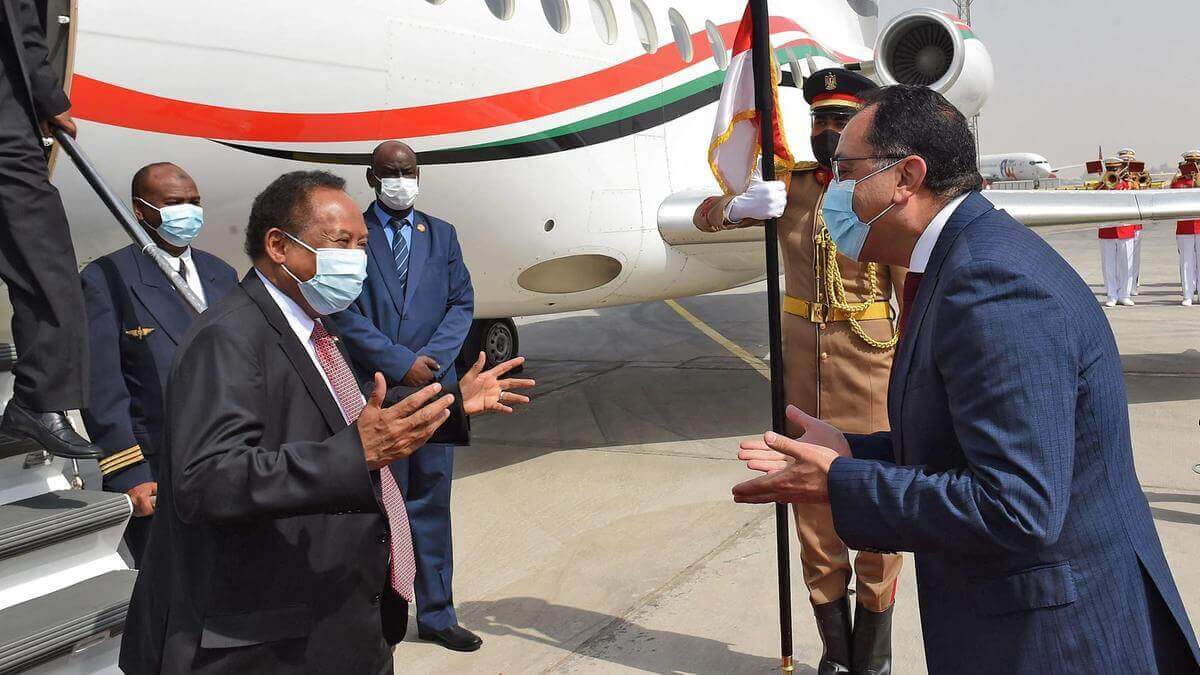Sudanese Prime Minister Abdalla Hamdok met with Egyptian President Abdel Fattah El-Sisi in Cairo on Thursday and agreed to strengthen cooperation with regional and international parties that could mediate the stalled Grand Ethiopian Renaissance Dam (GERD) negotiations.
The leaders agreed to press forward and “activate” Sudan’s proposal to form an international quartet to mediate the talks, which would include the United States (US), the European Union (EU), the United Nations (UN), and the African Union (AU), to help broker a deal on the filling and operation of Addis Ababa’s $4.2 billion dam on the Blue Nile river. The dispute centres around how much water Ethiopia will release downstream if a multi-year drought occurs, and how the countries would settle any future conflicts on the matter.
The Nile is an international watercourse that has historically been linked mainly to Egypt. It provides nearly 96% of Egypt’s renewable freshwater, and since the country receives abysmally low levels of rainfall, almost 95% of its total population lives within 12 miles of the river, using its resources for agriculture, industrial production, and sewage treatment. But over the past few decades, demands from other riparian states to access the river’s waters and utilize its resources have been perceived as a major national security threat by Egypt. The main issue remains to be that of the GERD, which would provide water and power to millions of Ethiopians, who currently face severe deprivation of these resources.
The Blue Nile, a major tributary of the Nile, originates in Ethiopia’s highlands and provides the river with 85% of its total water flow. Put simply, it provides an overwhelming majority of the water that Egypt’s existence depends on. However, Ethiopia has not been allowed to access Egypt’s water resources due to a myriad of political, economic, and geostrategic reasons, even though it contributes such an overwhelming majority of Egypt’s total available water. The GERD is meant to solve Ethiopia’s water shortages and generate a new electricity source by which it can export power.
In its riparian region, the GERD could majorly benefit Sudan, since it would provide cheap electricity and reduce river flooding. However, Khartoum fears that, depending on the volume of water discharged daily, the large operation could threaten its own dams, which are far smaller and downstream. Meanwhile, Egypt’s position on reducing flow stems from fears that the dam will decrease its supply of Nile water and that any diversion would lead to a significant amount of evaporation and water loss. Therefore, its paramount interest lies in preserving the current status quo.
Thursday’s meeting came just a few days after Sisi’s official visit to Khartoum, where he and Sudanese officials rejected Ethiopia’s unilateral plans to move forward with the second phase of the project without consultation or agreement with the other states involved. “We are concerned about Ethiopia’s intention to move forward with the filling of the dam for the second consecutive year without coordinating with the two downstream countries,” Egypt’s Prime Minister Mustafa Madbouly reiterated in a joint news conference on Thursday with Hamdok. However, the counties expressed hope that comprehensive and binding legal arrangements on the matter could be reached before the next rainy season and stressed that they would intensify coordination between them during this “critical stage.”
Apart from the Egyptian president and prime minister, Trade Minister Mohamed Maeet and Chief of the Egyptian General Intelligence Service Abbas Kamel also attended the talks. Meanwhile, the Sudanese delegation included Minister of Foreign Affairs Mariam Al-Sadek Al-Mahdi, Minister of Irrigation Yasser Abbas, as well as the ministers of Sudan’s general intelligence, health, planning, finance, and international cooperation. The officials also discussed various opportunities for strengthening bilateral ties between Cairo and Khartoum, in the fields of electricity, transportation, agriculture, and irrigation.
Sudan, Egypt Meet to Discuss Nile Dam Dispute
The countries agreed to strengthen cooperation with regional and international parties that could mediate the stalled Grand Ethiopian Renaissance Dam (GERD) negotiations.
March 12, 2021

Egyptian Prime Minister Mostafa Madbouly welcomes his Sudanese counterpart Abdalla Hamdok upon his arrival in the Egyptian capital of Cairo. SOURCE: AFP via THE NATIONAL NEWS
